“The little pairs of multicoloured sandals are neatly lined up against the wall. The children greet us with a shy Namaste, they are very touching in their blue and white uniforms.


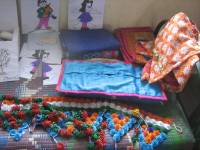
The classroom is decorated with many works of handicraft on the walls and tables. The supervisor explains that she aims at developing the children’s curiosity and making them learn while playing.
The teachers make also some handicraft articles to sell in the surrounding villages in order to make some more money. They show us the results : bags, doormats, typical bed-covers, etc.
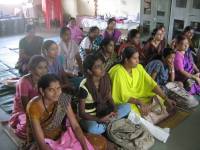 They came from the whole district ; all have been trained by Vanasthali. One of them said that, thanks to Vanasthali, she was able to give her children a better education.
They came from the whole district ; all have been trained by Vanasthali. One of them said that, thanks to Vanasthali, she was able to give her children a better education.
They say that the beginnings had been difficult, because of their families and neighbours’ lack of understanding : villagers were not favorable to seeing these women dancing and singing during their training. Finding a place to teach in was another difficulty. But they have acquired much consideration, mentalities are evolving from the inside.
The women start to understand that they can change their own conditions and have an influence on the rest of society without directly challenging the old traditions.
Some of them would like to go to university but it is difficult because the government doesn’t give grants to promote further education in rural areas.”
Léa Arson Compiled and translated by M.N. Fraysse and P.Portoleau
“Teachers and children had prepared an exhibition with the last term’s work. We were amazed seing their creativity. Many devices were made with recuperated or natural materials like lentils, used goblets, sandals made with used plastic bottles... this was an occasion for the teachers to show the quality of their work and everyone’s improvements. An official from the state government was also there. In Hobby classes, the teachers don’t work independantly as in a Balwadi ; but teach one hour a day in government or municipal regular schools, in addition. But they are trained and paid by Vanasthali. The children are more motivated and evidently progress, which is a source of satisfaction for the Vanasthali teachers.”
Léa Arson Compiled and translated by M.N. Fraysse and P.Portoleau
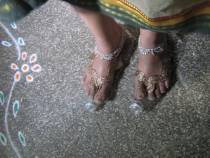
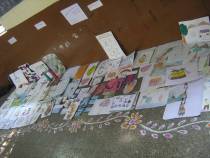
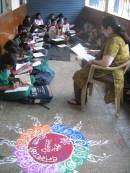
“When I entered the hall, I saw about 50 women, sitting on the floor, forming a bright multicoloured sight. All of them are Vanasthali supervisors. They have come from 10 different districts for the week end, along with a few donators (more than 100 donators had been invited, though).
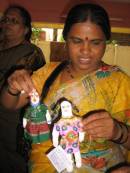 The meeting starts with Madhuri Purandare, Nirmala’s daughter, presenting the marvelous book she wrote and illustrated, to teach Marathi in a pleasant way. Then the supervisors started discussing, and showing each other the articles they made in their respective centres : invitation cards, dolls, drawings.... They talked about their problems, their solutions, and the progress they noticed in the children.
The meeting starts with Madhuri Purandare, Nirmala’s daughter, presenting the marvelous book she wrote and illustrated, to teach Marathi in a pleasant way. Then the supervisors started discussing, and showing each other the articles they made in their respective centres : invitation cards, dolls, drawings.... They talked about their problems, their solutions, and the progress they noticed in the children.
Aparna announced the celebration of the 25th anniversary of the Baramati centre for which she is responsible. The 600 Vanasthali teachers are invited for this occasion next December. All applauded.
The dinner is a good opportunity for me to come to know them. They want to know what I’m doing, whether I like the food, how I live here, if I cook for myself.... They show me some pictures of their children, talk about their husbands... Most had prepared the food for the family during their absence, while others had their daughters in law taking over the responsibilities of the house.
Sujata (37 y.o.) says she had worked in a nursery school for several years but when she met a Vanasthali member, she decided to join the association as a supervisor in Kolhapur. She likes children and wanted to contribute to social work. She teaches children who can’t attend school (one is busy at home, and another deprived of lower limbs).
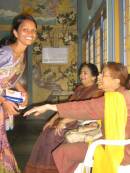 Asifa works in a remand home. She explains that the children there are lacking the education which is usually given by the family, hence their difficulties in studying. She helps them in Marathi, mathematics, English, history, and geography during 90 minutes every morning before school.
Asifa works in a remand home. She explains that the children there are lacking the education which is usually given by the family, hence their difficulties in studying. She helps them in Marathi, mathematics, English, history, and geography during 90 minutes every morning before school.
These women acting with simplicity and humility, though strongly implied, are very moving.
For the night, the big meeting hall is transformed into a dormitory.
It is just a few days since the “teachers’ day” : so, the following day was the occasion for attributing awards to the best teacher trainer, the best balwadi teacher and the best supervisor. They were given 1000 roupies each.
After lunch, they will go back to their towns and villages, by train or bus, and they will share their experience with the other teachers who will make good use of it with the children and trainees.”
Léa Arson Compiled and translated by M.N. Fraysse and P.Portoleau
 They came from the whole district ; all have been trained by Vanasthali. One of them said that, thanks to Vanasthali, she was able to give her children a better education.
They came from the whole district ; all have been trained by Vanasthali. One of them said that, thanks to Vanasthali, she was able to give her children a better education.







